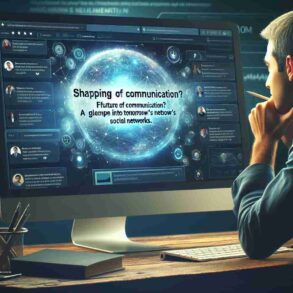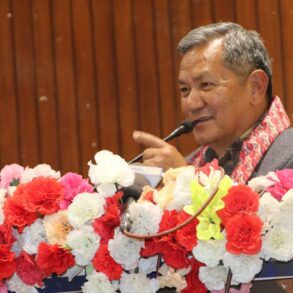Those who believe global heating is a conspiracy get most of their information about news and current events from commercial and social media, according to a study by researchers at Monash University.
The study, led by Prof Mark Andrejevic and Assoc Prof Zala Volcic, found that those who relied on social media as the main source of news scored lower on a measure of “civic values” than people who relied on newspapers and non-commercial media.
Civic values were defined as an individual’s belief in democratic institutions and practices, as well as their openness to considering perspectives that challenged their own.
Respondents were asked questions such as “When you encounter information about politics that challenges your point of view, what do you tend to do?” and provided with multiple choice answers.

For the climate change question, researchers asked whether “fluctuations in the climate are the result of natural cycles that take place regardless of human activity”.
Of those who got most of their news from commercial TV and radio, 37% agreed with the statement. Of those who got most of their information from social media, 25% believed climate change was a conspiracy.
Conversely, those who disbelieved in conspiracies about climate change were more likely to get their information from public broadcasters ABC and SBS. Only 2% of those whose main source of information was public radio and 6% of those whose main source was public television believed the climate crisis was a conspiracy.
Andrejevic said the most striking finding in the study – titled Mapping Civic Disposition, Media Use and Affective Polarisation – was that almost 60% of the 2,000 Australians surveyed who said their main source of information about news and current events was social media fell in the bottom half of the civic values scale.
However, the majority of those who relied on newspapers, public broadcasters and online news aggregators fell in the top half of the scale.
“Free speech is based on the idea that people have been educated enough in the values of civil society to be willing to engage in good faith discussion, but what you see online is that doesn’t happen at all,” Andrejevic told Guardian Australia.
“We wanted to see how the different media actually cater to scoring higher or lower on this set of values that we think are important for democracy.”
Earlier this month, Meta announced it will get rid of factcheckers on its platforms Facebook, Instagram and Threads, a decision some critics say will accelerate the spread of misinformation and disinformation.
“This is why it’s been so interesting to hear in recent weeks how social media is actually turning away from factchecking: because they’re pretending – and I think it’s a pretence – that they’re being more hands-off; but they’re not hands-off, because they build these algorithms to pump stuff into our feeds,” Andrejevic said.
“Algorithms do that based only on commercial values: is it viral, will it get engagement, will it get attention? Not at all on: is it important, accurate or useful for participating in democracy?”
Despite the rapid growth of social media, commercial television remained the most popular source of news and information, with 28% of survey respondents relying on it for information, compared with 27% for social media.
after newsletter promotion
Channels Nine, Seven and Ten, along with commercial radio, were the main source of information for 34% of the population.
The survey, conducted by Essential Research, found that those who relied on commercial TV scored even lower than those who relied on social media: 63% were in the bottom half of the civic values scale.
Those who scored highest relied primarily on ABC radio: 67% in the top half of the scale.
“It has become something of a truism that social media is not great for democracy,” Andrejevic said. But in his view, “no one has really systematically tested that until now”.
What Andrejevic and his colleagues tested was the relationship between media use and civic values, rather than the impact of social media.
“We have created something of a new category, which focuses on the attitude people take toward the content they encounter and how this reflects democratic values,” he said.
More research was needed, however, to determine whether social media platforms fostered lower civic values or simply catered to them.
“We don’t have the evidence to answer that,” Andrejevic said.
“It could be that social media just attracts people who score lower on these questions; and people who listen to ABC radio tend to score higher because they seek that out.
“But one thing we can’t say, for example, is that social media makes people have lower civic values.”





